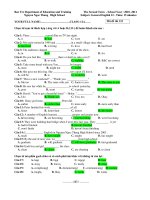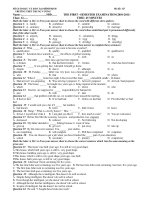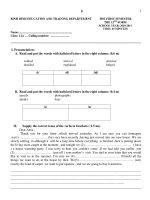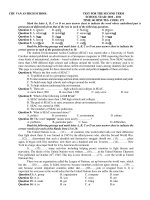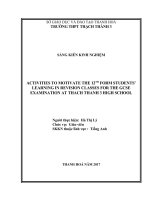THE FIRST SEMESTER THE 12TH FORM SCHOOL YEAR: 2010-2011 doc
Bạn đang xem bản rút gọn của tài liệu. Xem và tải ngay bản đầy đủ của tài liệu tại đây (32.56 KB, 4 trang )
B
1
BINH DINH EDUCATION AND TRAINING DEPARTEMENT THE FIRST SEMESTER
THE 12
TH
FORM
SCHOOL YEAR: 2010-2011
TIME: 45 MINUTES
Name:
Class: 12A … Calling number: ……………….
I. Pronunciation:
A. Read and put the words with italicized letters in the right column: (0.6 m)
walked arrived arrested
decided explained helped
/t/ /d/ /id/
B. Read and put the words with italicized letters in the right column: (0.4 m)
speeds photographs
speaks days
/s/ /z/
II. Supply the correct tense of the verbs in brackets: (1.5 ms)
Dear Anna ,
Thank you for your letter ,which arrived yesterday. As I am sure you can immagine
,we(1)……………………….(be) very busy recently ,having just moved into our new house .We are
slowly settling in although it will be a long time before everything is finished .Jack is putting down
the living room carpet at the moment , and tonight we (2)…………………………………… ( have
) a house warming party. I was sorry to hear you couldn’t come .If we had told you earlier ,you
(3)……………………………… (put off ) your mother’s visit .You said in your letter that you would
like to visit us in the summer. I’m sure we (4)……………………………………. (Finish) all the
things we want to do in the house by then .We(5)……………………………………………. (see)
exactly the kind of carpet we want to put upstairs , and we are going to buy it tomrrow.
B
2
III. Supply the correct word forms: (1,5 ms)
1.Would you mind if I asked you some (person)questions?
2.To solve the problem, our government introdused a number of ( renovate)
measures
3. The bride and groom would pray asking their ancestors’ (permit) to get married
4.Cultural differences can make people feel ( comfort) , frightened or even insecure.
5. Under the Party’s guidelines, the government adopted the Enterprise Law, which encouraged both
domestic and foreign privite ( invest)
IV. Fill each blank with one suitable word from the list to complete the following sentences.
Use each word once only: (1,5 ms)
better studying teachers schools talks museums
WILL TECHNOLOGY REPLACE SCHOOL?
Some people believe that soon schools will no longer be necessary. These people say that
because of the Internet and other new technology, there is no longer any need for school buildings,
formal classes, or ………………… ….(1) Perhaps this will be true one day, but it is hard for me to
imagine a world without……………………….(2) . In fact, we need to look at how we can use new
technology to make schools …………………….…(3)., not to eliminate them.
We should invent a new kind of school that is linked to libraries, …………………… …(4),
science centres, laboratories and even companies. Experts could give ………………………… …(5)
on video or over the Internet. TV networks and local stations could develop programming about
things students are actually …………………………….…(6) in school.
V. Rewrite each sentence, beginning as shown, so that the meaning stays the same: (2.5 ms)
1. You sent me a present. Thank you very much for it. (relative clause)
Thank
2. The teacher notices the students. They often come to class late. (relative clause)
The teacher
3. We got lost because we didn’t have a map.
If
4. Sasha is explaining some Russian traditions. (passive voice)
Some
5. We took many pictures though the sky was cloudy.
Despite
________________________________________________________________________________
VI. Read the following passage and answer the questions: (2 ms)
Education in England
B
3
Every child in Great Britain between the age of five and fifteen must attend school. There are three
main types of educational institutions: primary [elementary] schools, secondary and universities.
State schools are free, and attendance is compulsory. Morning school begins at nine o’clock and
lasts for three hours, until half past four. The school is open five days a week. On Saturdays and
Sundays there are no lessons. There are holidays at Christmas, Easter and in Summer. In London as in
all cities there are two grades of state schools for those who will go to work at fifteen: primary
schools for boys and girls between the ages of five and eleven, and secondary schools for children
from eleven to fifteen years.
The lessons are: reading, writing, the English language, English literature, English history,
geography, science, Nature study, drawing, painting, singing, woodwork and drill [Physical training].
1. What are the three main types of educational institutions?
2. What are the two grades of state school for those who will go to work at fifteen?
3. When do children attending state school in Britain have schooldays off every week?
4. When do pupils have holiday?
The end
Key:
I. Pronunciation: ( 1m )
A
/t/ /d/ /id/
worked arrived arrested
helped explained decided
B.
/s/ /z/
speaks speeds
photographs days
II. Supply the correct tense of the verbs in brackets: (1.5 ms)
1. have been 2. are having/ are going to have 3. would/ could have put off
4. will/ shall have finished 5. have seen
B
4
III. Supply the correct word forms: (1,5 ms)
1. personal 2. renovation 3. permission 4. uncomfortable 5. investment
IV.Fill each blank with one suitable word from the list to complete the following sentences.
Use each word once only: (1,5 ms)
1. schools
2. teachers
3. better
4. museums
5. talks
6. studying
V. Rewrite each sentence, beginning as shown, so that the meaning stays the same: (2.5 ms)
Thank you very much for the present( which/ that ) you sent me
The teacher notices the students who/ that often come to class late.
If we had had a map , we would not have got/ gotten lost
Some Russian traditions are being explained by Sarah
Despite the cloudy sky, we took many pictures
VI. Read the following passage and answer the questions: (2 ms)
1. There are three main types of educational institutions: primary [elementary] schools, secondary
and universities.
2. primary schools for boys and girls between the ages of five and eleven, and secondary schools
for children from eleven to fifteen years.
3. On Saturdays and Sundays
4. at Christmas, Easter and in Summer
